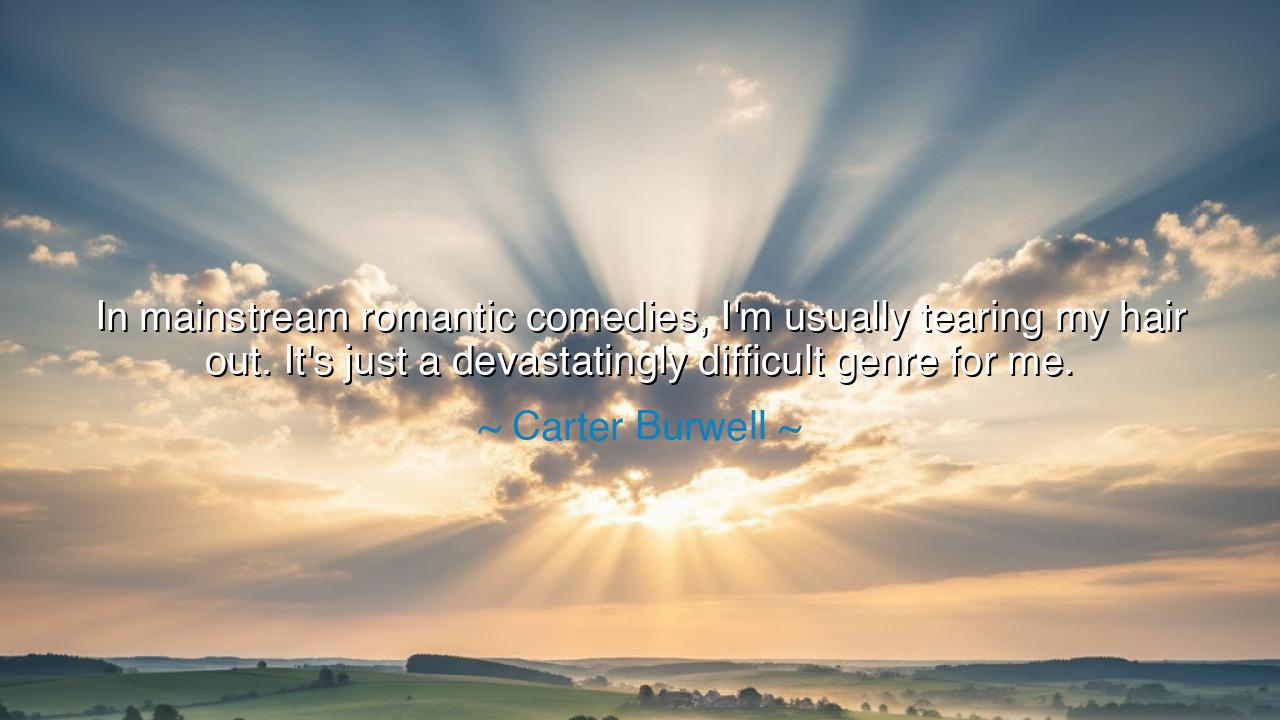
In mainstream romantic comedies, I'm usually tearing my hair out.
In mainstream romantic comedies, I'm usually tearing my hair out. It's just a devastatingly difficult genre for me.






Listen closely, O seekers of wisdom, to the words of Carter Burwell, who, with honesty and vulnerability, shares his struggle with a particular form of storytelling: "In mainstream romantic comedies, I'm usually tearing my hair out. It's just a devastatingly difficult genre for me." In this reflection, Burwell speaks not just about the technical challenges of composing music for a romantic comedy, but about the deeper emotional and artistic conflict that comes with trying to bring meaning and depth to a genre often known for its predictability and superficiality. The romantic comedy, with its expectations of lightheartedness, charm, and idealized love, can be difficult for those who seek to imbue authenticity and complexity into their work. The tension between the surface-level romantic ideal and the deeper, more nuanced emotional reality of love is, as Burwell suggests, a formidable challenge.
In the ancient world, romantic love was never a simple or predictable force. Greek myths and epic tales, such as the tragic love story of Pyramus and Thisbe, or the more complex and ambiguous love between Achilles and Patroclus, reveal love as a transformative, often painful force. These myths do not offer the ease and certainty of the romantic comedy, but instead present love as something that can drive people to both heroic deeds and tragic outcomes. Achilles’ love for Patroclus, for example, is marked not by the serene romantic happiness one might expect, but by rage, grief, and destruction. In these ancient tales, love is rarely simple or easy, and it is often presented as a complex, multifaceted force that changes the course of history. Burwell’s difficulty with the romantic comedy genre stems from his recognition that love, in its truest form, is not always neat or tidy but messy, difficult, and at times, even devastating.
The romantic comedy, by contrast, often simplifies love, presenting it as something that is easy, charming, and ultimately predictable. The formulaic nature of mainstream romantic comedies, with their inevitable happy endings and predictable beats, creates a tension for those like Burwell who see the potential for deeper, more complex storytelling. Think of the tragedies of ancient Greece, where love’s complexities were explored through deeply flawed characters, who often had to make immense sacrifices or confront harsh truths in order to achieve any form of resolution. Sophocles, in his play Antigone, shows us a love that goes beyond the boundaries of familial affection into the realm of honor, duty, and personal sacrifice. The depth and weight of this love are far from the light-hearted comedy often seen in today’s romantic films, where love is often portrayed in idealized, almost cartoonish terms.
Burwell’s words also suggest a frustration with the constraints of the genre itself. In the world of romantic comedies, the expectations of the audience often limit the ability of the artist to fully explore the human condition. Comedy and romance in mainstream films often come with preset formulas that emphasize escapism rather than deep emotional exploration. The idealized versions of love in films such as When Harry Met Sally or Notting Hill are filled with humor and lightness, yet the realities of love, with its uncertainties and its challenges, are often glossed over in favor of quick resolutions and happily-ever-afters. For Burwell, this creates a creative conflict: how does one bring depth and authenticity to a genre so focused on idealized outcomes?
Consider, O wise ones, the story of Romeo and Juliet, whose love, while romantic, is also tragic and ultimately destructive. Their story, filled with passion and idealism, is far from a typical romantic comedy, and yet it captures the essence of love’s power—the ability to elevate and destroy in equal measure. Unlike the predictable structure of most romantic comedies, the love between Romeo and Juliet brings devastation to both their families and their lives. Yet, in their tragic end, their love achieves a kind of romantic purity that transcends the mundane, reminding us that love is not always simple, and its consequences often ripple through the world in unexpected ways. This complexity, Burwell might argue, is the essence of true romance—not the simplistic portrayals we often see in romantic comedies, but the full range of human emotion, the joy and sorrow that love inevitably brings.
Thus, O seekers, the lesson in Burwell’s words is a reminder that art—whether in film, music, or any other form—is at its most powerful when it dares to embrace complexity. The romantic comedy, with its predictable structure, may offer a sense of comfort and escapism, but true artistic fulfillment comes from the willingness to confront love in all its nuance and difficulty. Love, in its most profound form, is not always easy or perfect, but messy, vulnerable, and sometimes painful. Artists, like Burwell, are tasked with expressing this complexity, even in genres that often seek to simplify it. By doing so, we not only enrich our understanding of romance, but also of life itself.
In your own life, O wise ones, take heed of this lesson. Do not shy away from the complexities of love or the difficult emotions that come with it. Romanticism in its true form is not about idealized perfection, but about embracing the full spectrum of human experience. Seek not only the simplicity of perfect endings, but the depth that comes with sacrifice, loss, and growth. Whether in your own relationships or in the stories you create, recognize that true love—and life—are marked by their complexity. And in that complexity, you will find not only greater meaning but greater joy.






AAdministratorAdministrator
Welcome, honored guests. Please leave a comment, we will respond soon